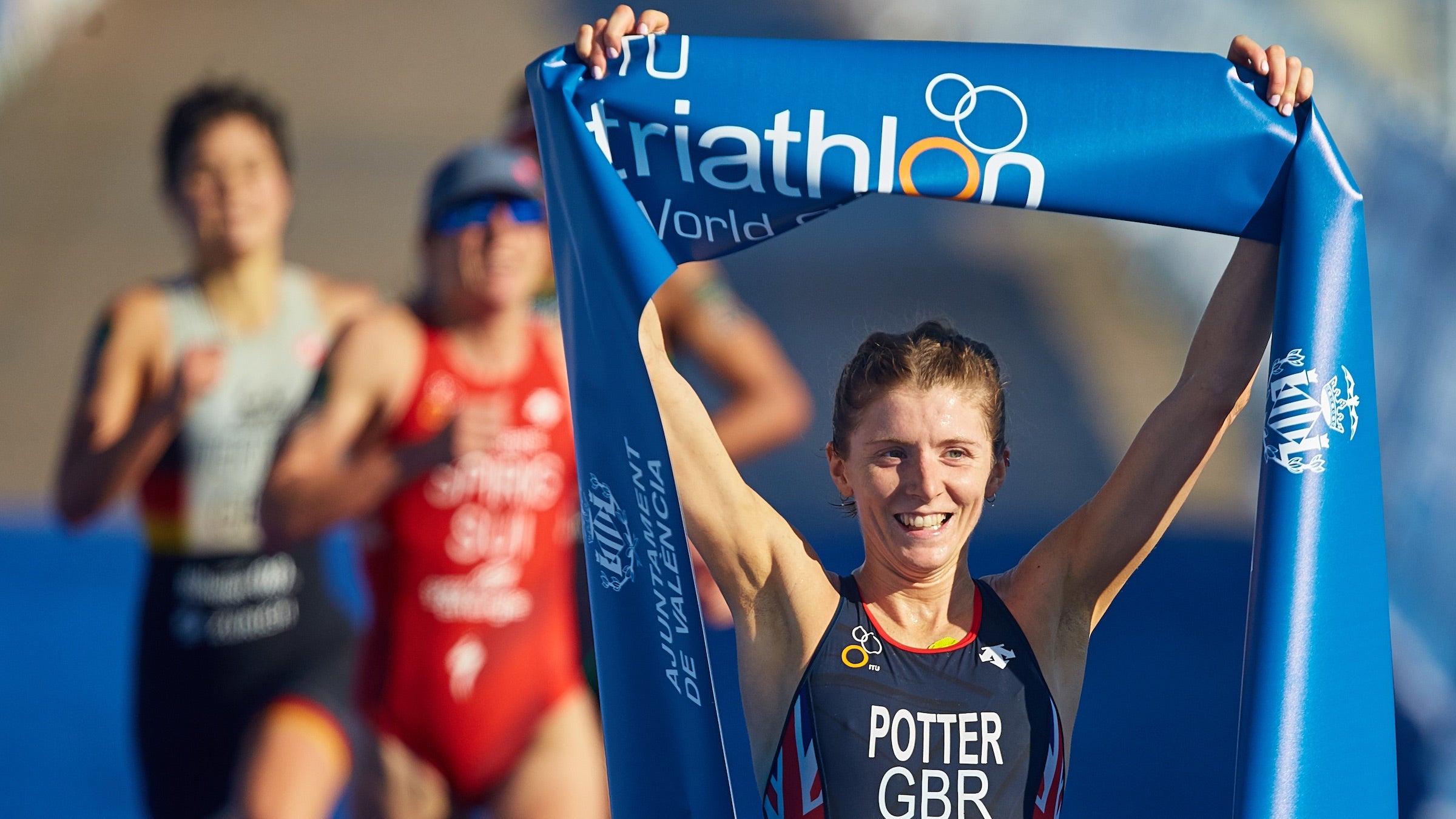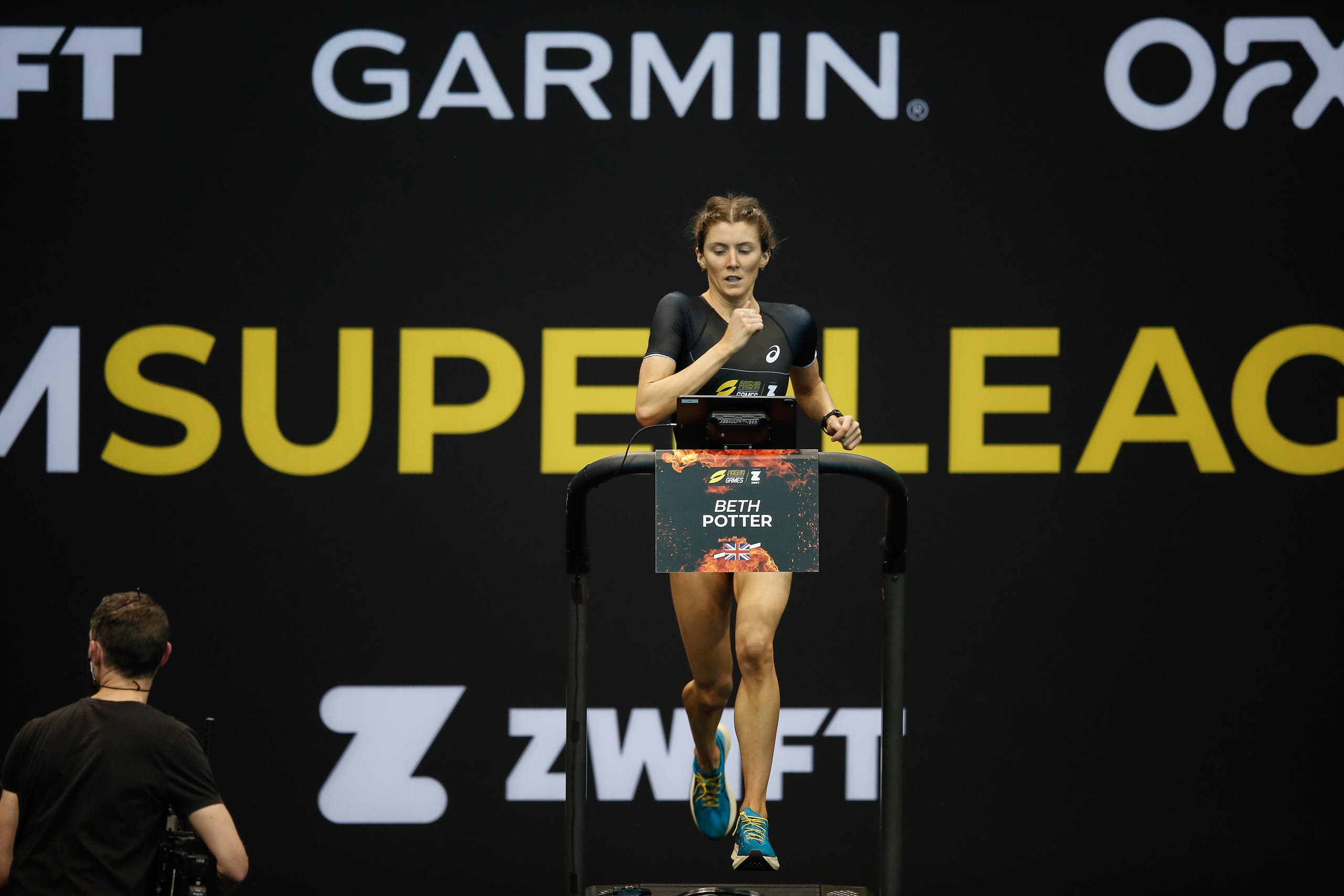Get to Know New British Star Beth Potter

Beth Potter wins at the Valencia World Cup in 2020. (Photo: David Aliaga/MB Media/Getty Images)
Beth Potter’s recent 5K world best time on the road made everyone in the triathlon world sit up and finally take notice, but with the attention came some potshots from those who said the PR was due simply to new carbon supershoes.
Yet, this Glaswegian won’t be derailed by a few naysayers. She is plenty equipped, as her favourite popstar might say, to shake it off. Training with the Brownlees, striking pre-race power poses, and blasting out Taylor Swift while running fewer miles than ever is proving a successful combination for triathlon’s latest hot property.
After all, the 29-year-old turned her back on a steady job as a physics teacher and a career as an Olympic runner to take up triathlon—and her stubborn toil is now paying off.
RELATED: Beth Potter Just Ran a World Record 5K—So Why Is She Doing Triathlon?
Brownlee Country for Beth
On Jan. 8, 2017, Potter moved to Leeds—Brownlee country for tri fans—and by the following day was clipping into cleats for the very first time. Had she even ridden a bike before?
“My fixie, around London, when I was teaching, but I’d come off a couple of times. It’s still the bit I need to work on. I’ve got the power and fitness to be able to deal with surges in races, but… it’s not even bike handling… it’s the confidence in a group,” she said.
At first though, cycling wasn’t about staying in a pack, it was just about sticking with her training buddies. Having sought counsel from the Brownlee brothers’ mentors Malcolm Brown and Jack Maitland, Potter initially moved into Jonny Brownlee’s home in Leeds just as her host left for a three-week training camp in Spain.
She downloaded Strava and spent the first week finding local routes and becoming accustomed with a road bike before heading out with the elite women, including 2013 World Champion Non Stanford.
“I quickly ramped up to four-hour rides and was really struggling,” she said. “I’d get two hour in and stop talking. There’d be a hand on the back helping me up the hills. Monday, Tuesday, Wednesday were long rides, and it was a knock-on effect; I was wiped for the rest of the week. I had no arms for the pool, no legs for the bike. I couldn’t even run that fast. It was awful.
Finding Her Way
Potter built an endurance base swimming competitively as a kid, and despite only running twice a week became one of the top juniors in Europe. The focus became more serious at university—but as she upped mileage, along came injuries. The disappointment of getting sick on the eve of the 10K at the 2016 Rio Olympics and finishing 34th—four minutes behind a new world record set by Ethiopia’s Almaz Ayana—proved a turning point.
“After Rio I had a month off to reset and decided: ‘I don’t want to do this anymore.’ It seemed so unachievable. Every time I went to a major champs it was so hard to compete with the Africans and I don’t just want to finish top eight.”
Left off the British Triathlon funding program – “They said I was too old to compete at the next Olympics and I’m not on the same trajectory as a developing athlete. It’s very ageist.” – she’s now had to build not only her bike legs, but her whole coaching team.
“It’s a bit random,” she said. “I’ve been criticized for having too many involved with my program, but I moved to Leeds and needed to build a team around me. Jack writes my overall program and oversees the whole thing, Andy Henderson does my running, Dane Mitchell is the strength and conditioning coach. He’s brilliant. A lot of it is based around not getting injured—a lot of loading through tendons I’ve had problems with in the past.
“I’ve also recently changed squads and train full-time with the boys.” ‘The boys’ is how she refers to the Brownlee brothers. This also means the swim coach is now Coz Tantrum, who tutored the Brownlees when they were early teens and adds “the attention to detail and technique stuff, which I really needed.”
And how is training with ‘the boys’? “I find it inspiring because I have to bring my A game every day. It’s like when I was younger and my parents were standing on poolside. A lot of it is about having a positive environment and it works for me.”
With the swim and bike volume, she’s running less than before—80-mile weeks have dropped below 30—and yet (as she proved running 14:41, the world’s best ever 5K time on the road) she’s also running faster than ever.
“I rarely get the opportunity to be pushed in a race like that. They went off at 2:51/km pace (4:35/mile) and I would never have done that on my own. I was able to get in a group of guys who could drag me along. Every time a gap opened up, I’d cover it, so I think that really helped.
“There was no pressure on me. I’m not a 5K runner. I wouldn’t even say I’m a runner anymore. I was doing it off the back of a really big tri training week and would have been happy with 15:15. It’s a good course, really low-key and relaxed.”
The new Asics Metaspeed Sky carbon-plated shoes helped too, providing free speed and a “definite placebo effect,” but the extra speed also came from not waking up with tired legs every day. “They are never really sore. With running, I was always just hobbling out of bed—and that was as a 23-year-old!”

The Olympics Question
Success at the Super League Games Arena Games in London last month gave an additional confidence boost, and provided more evidence that her swimming is reaching the level to make her a front-pack racer. But despite being European champion in 2019 and winning a first World Cup in Valencia last fall, the chance of being on the start-line for Tokyo 2021 seems remote. The British team of Georgia Taylor-Brown, Jess Learmonth, and Vicky Holland has already been selected.
“I don’t see them deselecting, and the long-term goal was always Paris 2024. It’s frustrating, but the girls did what they did to be picked. I don’t want to seem like the baddie and it would be awful to be deselected—I’d be devastated. I don’t wish that on any of them.
“All I can do is focus on me. If I can get as high on the World Triathlon Championship Series as possible then next year I won’t have a problem with starts, and will be in the best position going into the next Olympic cycle.”
First, though, comes a return to Super League indoor action this weekend in Rotterdam, before a trip to Yokohama for the first WTS race of the year against a world-class field, many of whom are stilling gunning for Olympic selection. Potter won’t look further than that for now. Tri is the first priority, but attention may turn back to the track with the British Olympic trials in June.
Power Pose and Taylor
Whatever path is chosen it will be with the pre-race ritual of striking her “power pose,” a concept borrowed from revered running coach Steve Magness, author of best-selling The Passion Paradox.
“I did it in my car before a Tuesday VO2 max swim session, and suddenly, something changed. I don’t know what it was, but I had a really good session and that got the ball rolling. I quite like my game face. I think I look a bit intimidating. I do my battle braids, then make out as if I’m on the start line. I don’t want to look scary, but I want my competitors to think I mean business.”
Those last few minutes before the starting horn are then filled by putting on some Taylor Swift. “I love Taylor, so I have to listen to her. After all the messages I received last week, I was thinking if this is what it’s like for me, imagine if I was Taylor Swift! It’d be dreadful!”